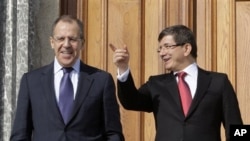The Turkish city of Istanbul will host the second round of talks between Iran and the so-called P5-+1 countries to discuss its controversial nuclear energy program. The Turkish hosts will be looking to play some role in the two days of talks that begin Friday.
Turkish diplomats led by Foreign Minister Ahmet Davutoglu have been working hard toward the success of the talks between Iran and the U.N. Security Council Permanent Members - Russia, the United Kingdom, the United States, China, and France - plus Germany.
The talks center on Iran's controversial nuclear energy program that is suspected of being used to make weapons. Last week after talks with EU foreign affairs chief Catherine Ashton, Davutoglu stressed Turkey is ready to do what it can.
He says one of the conditions of being a good host is to provide the best ground for each side to carry out the negotiations in the most psychologically peaceful setting. "If we are asked to help by both sides for the negotiations we are ready to do so, but our role is to be host here, and to do it in the most comprehensive way," he said.
Turkey, which is a NATO member and an EU applicant, has close relations with its neighbor, Iran. Davutoglu has worked to position Turkey as a key mediator between Iran and the West. Those efforts culminated last year in a deal Turkey and Brazil reached with Tehran for it to ship some of its uranium abroad for reprocessing.
But when the deal was rejected by the international community, Turkey voted against new U.N. Iranian sanctions. That vote, according to political scientist Soli Ozel, means for now Turkey has lost its role as mediator.
"We downgraded ourselves from mediator to facilitator after the U.N .vote, but I am sure we [Turkey] are just dying to get to the mediator position again. But at the end of the day the second meeting is going to take place in Istanbul," he said.
The Turkish government has been trying to rebuild its credibility with its Western allies, according to diplomatic correspondent Semih Idiz.
"The Turkish side is playing it more cautiously. Turkey declined to send its ambassador on the inspection tour of the nuclear sites, that Tehran had organized. The Iranians had extended an invitation to a number of countries, and Turkey declined that, not wanting ... to appear to be too pro-Iranian and therefore stay in the middle ground. I think we are seeing this happening now," Idiz said.
Few analysts are expecting any major breakthrough in the talks, many say the continuation of the talks after Istanbul will be considered an achievement. After meeting Thursday with Davutoglu, Russian Foreign Minister Sergei Lavrov warned the United States against undermining the talks with threats of further sanctions against Iran.
Idiz says in such an expected challenging atmosphere, Turkey can still play a role as a pacifier.
"We will be, properly, be more of [a] role in terms of trying to convince Iran to be more compliant and be more forthcoming with the international community. So it [Turkey] can play this back-channel role of trying to moderate the more defiant moods and atmosphere, and statements coming out of Tehran so it can have a pacifying role in that respect," Idiz said.
Analysts say if Turkey can play such a role it will not only help the talks to continue, but also answer many critics in the West who have until now questioned whether Ankara has any real influence over Tehran.
World Powers Gather in Turkey for Iran Nuclear Talks
















